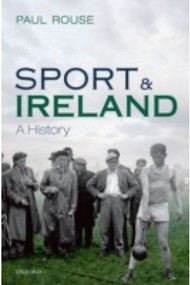
The sports bulletins also carried stories relating to today's meeting between the Irish Amateur Boxing Association (IABA) and Sport Ireland. The parties will appear before the Transport Committee of the Department of Transport, Tourism and Sport (here). The meeting will discuss the departure of Billy Walsh to coach in the United States. Given the funding provided to Irish boxing by the government, the meeting is "an offer the parties could not refuse" (I realise an IABA representative also suggested that Walsh might have received this type of an offer from the US).
The extent of the funding provided by the state to sport may be a recent phenomenon but the interaction between sport and politics has a long history. The relationship between sport and politics in Ireland is one of the themes in Paul Rouse's superb book Sport & Ireland. It does the book an injustice to highlight only some of the accounts provided but it does give a flavour of the impact politics has on sport. During the 18th century, and early 19th century, the state was concerned with the way sport brought people together in one place. In such gatherings political unrest could ferment. It was through legislation that small powerful minorities sought to shape or ban sport. It could be the temperance movement or those concerned about animal rights. There was a time when bear and bull baiting drew large crowds! The concerns surrounding the relationship between alcohol, gambling and sport has been a constant theme in sport.
Those who worry about the potential success of the "national" boxing team post-Walsh might ponder what exactly "national" means. Again, Sport & Ireland provides an amount of food for thought. For example, Manchester United captain Johnny Carey "played for the IFA Ireland team against England at Windsor Park on 28 February 1946 and did the same for the FAI Ireland team at Dalymount Park two days later". Other examples arise in relation to the Olympic games. Over a century ago, Peter O'Connor unofficially raised an Irish flag in an effort to ensure the British did not claim credit for an Irish success.
There is also a history of difficulties in the funding of sport and sport events. Rouse gives an almost comical account of the Tailteann Games where different elements of the state seemed to be pulling in different directions. That would not happen nowadays. Or would it?
 RSS Feed
RSS Feed